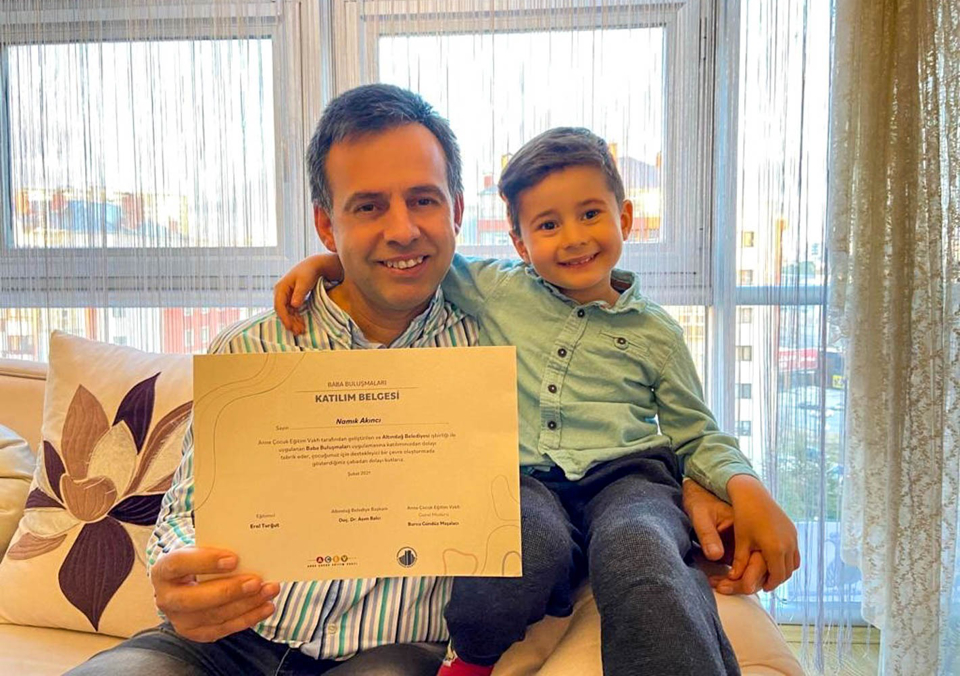Fathers in Turkey embrace a new journey: Equal share of household and childcare responsibilities
Date:
Fathers in Turkey are inspired to get more involved in childcare and household responsibilities, thanks to an online initiative aimed to support involved fatherhood and the development of children, launched by the civil society organization Mother Child Education Foundation, under the UN Women regional programme on ending violence against women in the Western Balkans and Turkey “Imple-menting Norms, Changing Minds,” funded by the European Union.

Happiness, excitement, and pride: these were the overall emotions of more than 180 fathers during the graduation ceremonies of the “Father Meetings” initiative, a five-month initiative conducted online this year within the Father Support Programme, implemented by the Mother Child Education Foundation (AÇEV).
“The COVID-19 pandemic has further reduced access to early children’s education and care, raising the risk of persistent household inequalities. Strengthening the households as a learning environment, maintaining physical and psychological well-being at home, and promoting an equitable division of household chores have been the top priorities for AÇEV in this period. So, we put all our efforts to support parents with our weekly meetings to help them overcome the difficulties they face as parents and to empower fathers to be more involved in the childcare and household responsibilities,” said Burcu Gündüz Maşalacı, General Manager of AÇEV.
91 per cent of fathers in Turkey consider that mothers are the primary caregiver of the child, according to the research “Involved Fatherhood and Its Determinants in Turkey,” conducted by AÇEV in 2017. Lack of fathers’ involvement results in unequal distribution of duties within the family, and such inequality leads not only to gender inequitable role models for children, but an overall disadvantage for women due to the disproportionate responsibility of care work and household duties, highlights the report.
In this regard, through15 “Father Meetings” groups attended by 189 fathers, it is aimed to strengthen the households in need, maintain the well-being of the families, support the development of children and parenting skills of the fathers.
Bulut Yılmazer*, a participant father, shared that the “Father Meetings” taught him to be more patient and calm and act more wisely. “It also taught me to be more understanding towards my children and my wife. I have seen the importance of spending quality time with my family through playing games, doing social activities, and actively communicating,” said the father during the online certification ceremony.
“My husband works hard and comes home tired. Until recently, he would immediately ask about dinner and wouldn’t help me with other chores. When he started participating in this programme, he first started playing with children more. A few weeks later, when he came home, he began to ask, ‘Can I help you?’ while I was preparing dinner,” said Hatice Elibol, the wife of a participant father and mother of two children.
Besides the participatory meetings held once a week during 10 weeks, the fathers also received boxes of learning resources at their homes. Inside the boxes were eight different packages to be opened weekly, each containing different developmental materials for children, such as an abacus, a tangram, play dough, crayons, storybooks, and instruction guides for parents.
İsmail Güneşli*, another father who graduated from the programme, mentioned that while he was reluctant to join at first, as the weeks passed, he started to notice a difference. “Communication with my daughter improved. I became more conscious about my role as a father and as a husband,” said the father.
“Throughout COVID-19, women have experienced an increase in domestic work and care responsibilities compared to men, and the gendered division of household labour continues. We support AÇEV in their work to encourage men to share domestic work and childcare responsibilities,” stated Irmak İnan Çınar, Project Analyst at UN Women.
“Everything I learned from the weekly meetings was invaluable. I will keep all those files and read the texts over and over again. I was not a violent father, but I was an impulsive person. I learned to ask questions, try to understand, and listen to my family more,” said Tarkan Soyer*, a participant father.
*All names in this article have been changed to protect their identity.